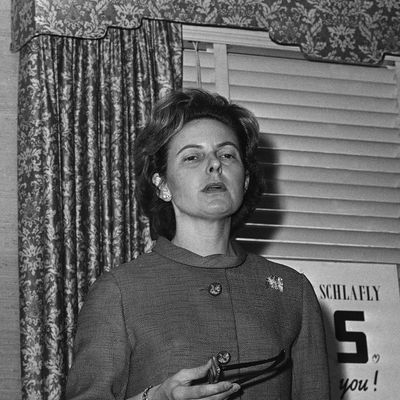
Last week, Donald Trump argued that minority voters concerned about the fact that he is a gigantic racist should support him because the opposing party used to be the home of even more gigantic racists. “It is the Democratic Party,” the Republican nominee argued, “that is the party of slavery, the party of Jim Crow.” Conservatives place strange importance on the historical fact that the Democratic Party used to be the natural home of southern white racial conservatives. It is reasonably well known that the Democratic Party’s embrace of civil rights drove that faction out. The other, less known factor that altered the composition of the two parties was the conservative takeover of the GOP, which turned the party against civil rights at just the same time the Democrats were turning toward it. Phyllis Schlafly, who died this weekend, happened to play an important role in this transformation.
In 1960, when Schlafly first arrived on the national stage, the conservative movement was a minority faction within the Republican Party. Conservatives regarded the liberal and mainstream wings of the party Establishment, like Nelson Rockefeller and Dwight Eisenhower, with undisguised loathing. The faction fights within the GOP mirrored those within the Democratic Party. Just as conservative Democrats fought to stop liberal Democrats from moving their party left on civil rights, conservative Republicans did the same with liberal Republicans.
In 1960, Schlafly led the conservative faction in a revolt against a platform plank opposing segregation and racial discrimination in voting and housing. In 1964, conservatives again defeated platform amendments endorsing the enforcement of the 1964 Civil Rights Act (which had already become law, over the objections of the Republican Party’s nominee, Barry Goldwater) and calling for the federal protection of voting rights. Just as racial liberals drove racial conservatives out of the Democratic Party, racial conservatives did the same in the Republican Party.
From the standpoint of the 21st century, legal apartheid is no longer a live political issue. And so conservatives attempt to associate the Republican Party with its old, moderate, and pro-civil-rights iteration, making the case that Republicans somehow remain the “party of civil rights.” Bizarrely, this case is even made regularly in the pages of National Review, whose editor, William F. Buckley, defended segregation in the South (and then, two decades later, in South Africa), and whose publisher, William Rusher, argued that conservatives could take over the GOP and replace the votes of defecting moderates by attracting conservative white Southerners.
As the civil-rights era has receded into the past, it has gotten easier for conservatives to muddle the historical lineage. Schlafly was one of the few conservatives with a long enough tenure to directly connect the conservative movement of today with its anti-civil-rights predecessors.
Of course, the most bizarre thing about the right’s historical revisionism is not that conservatives try to associate themselves with the policies of the faction they deliberately drove out of their party in part because it supported civil rights. It is the unstated presumption that racism has been banished from American politics and African-Americans today vote for the Democratic Party out of misplaced nostalgia. If you read things like William Wan’s brutally detailed exposé of vote suppression in North Carolina, you can see the GOP identifying voting mechanisms preferred by African-Americans and systematically eliminating them. It is true that Republicans once favored civil rights, before conservatives took the party over. What possible reason is that to support a party that now passes laws specifically designed to prevent African-Americans from voting today?






























